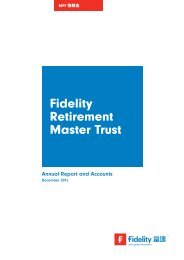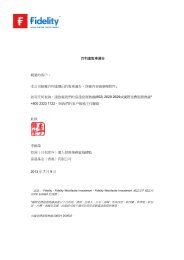SKANDIA GLOBAL FUNDS PLC - Fidelity Investments
SKANDIA GLOBAL FUNDS PLC - Fidelity Investments
SKANDIA GLOBAL FUNDS PLC - Fidelity Investments
Create successful ePaper yourself
Turn your PDF publications into a flip-book with our unique Google optimized e-Paper software.
Skandia Global Funds plc<br />
Annual Report and Audited Financial Statements for the year ended 31 December 2011<br />
<strong>SKANDIA</strong> SWEDISH EQUITY FUND<br />
INVESTMENT ADVISER’S REPORT FOR THE YEAR ENDED 31 December 2011<br />
Skandia Swedish Equity Fund – Enter Fonder AB<br />
Below is a report from the Investment Adviser of the Skandia Swedish Equity Fund for 2011.<br />
The Skandia Swedish Equity Fund was launched on 13 September 2000 with a starting Net Asset Value per share of SEK 10.00.<br />
Investment Adviser’s Commentary<br />
The Skandia Swedish Equity Fund underperformed its benchmark, the SIXPRX Index, for 2011. The fund returned -22.04%,<br />
compared to the benchmark index that returned -13.60%.*<br />
During the first quarter, the overweight exposure to industrials was the main reason behind the lag, as the sector underperformed the<br />
market over the quarter after a very strong finish to 2010. In addition, slightly disappointing fourth quarter numbers raised questions<br />
on how Swedish exporters will be able to handle the combination of a strong Swedish Krona and rising input prices. The Japanese<br />
earthquake added to concerns, especially for auto-related names which will most likely suffer from production disruption in the<br />
second quarter.<br />
One of the main detractors from performance included Electrolux, which suffered from weak sentiment for consumer stocks in<br />
general, compounded by the board‟s decision to only pay a small dividend. Autoliv was affected by supply issues affecting car<br />
production worldwide and the earthquake in Japan impacted their operations in the region. Meanwhile, Sandvik suffered from a<br />
number of misfortunes, including Australian floods affecting an important end market, productivity issues in the materials division<br />
and concerns about Sandvik‟s Nuke business after the Japanese earthquake. In addition, Indutrade was weak, reporting a<br />
disappointing fourth quarter, mainly due to its acquired company not performing according to expectations.<br />
The largest positive contributors included MTG, which rebounded, supported by strong market data from Sweden and Russia, and<br />
JM, which reported solid fourth quarter numbers on the back of a strong residential construction market in Sweden. Swedbank<br />
performed well due to new financial targets including a buy back mandate, while Hexagon benefited as the Intergraph acquisition is<br />
attracting foreign investors.<br />
In the second quarter of 2011, The fund‟s underperformance was largely due to not owning Ericsson, a strong performer following<br />
its Q1 results. Other negative contributors included JM, as the market was concerned about the impact of higher interest rates on<br />
housing, and MTG, as a weak ratings trend triggered concerns over higher programming costs. Meanwhile, Avanza suffered as its<br />
much-liked CEO stepped down, Lindab was weak due to management guiding down ahead of its Q2 results, and Boliden was hurt<br />
by disappointing results due to internal problems and worries about global growth.<br />
On the positive side, ABB performed well thanks to a good order intake, while Hexagon rose as its transition to more software is<br />
being rewarded. Autoliv benefited from indications that auto production is coming back after the Japanese earthquake and parts<br />
shortage, Alpha Laval gained as late cyclicals were increasingly in favour, while Haldex had a good run ahead of its spin-off and big<br />
dividend pay-out.<br />
In the third quarter the most severe setback occurred in August when the European debt crisis escalated, sending risk premiums up,<br />
while risky assets tumbled. The Skandia Swedish Equity Fund underperformed its primary benchmark, the SIXPRX Index with a<br />
total net return of -23.9%, while the benchmark index declined by 19.8% in the third quarter.* In general, the portfolio‟s holdings<br />
were tilted towards a more positive scenario than the one that materialised during the summer.<br />
Among the biggest negatives for the portfolio included the shares of the holding in JM, which fell on fears that the residential<br />
housing market would turn down sharply. The holding in Volvo suffered a setback on cyclical concerns heightened by the<br />
company‟s bad performance in the last downturn. Autoliv was subject to an anti-trust investigation, which hit the share price, and<br />
cyclical concerns also weighed on its stock. Shares in Hexagon proved vulnerable to worries that the company‟s relatively high<br />
leverage would exacerbate cyclical impacts, while MTG‟s stocks succumbed to fears that the Scandinavian ad market would be hit<br />
by the downturn.<br />
The biggest positives for the fund included a position in Kinnevik, a holding company with stable cash flows whose shares trade at a<br />
high discount; Millicom, which benefited the fund thanks to solid top line growth in combination with high payouts and share buy<br />
backs; Meda, which is seeing the return of organic growth, while becoming more aggressive on acquisitions; Mekonomen, which<br />
posted strong results, notably from a recent acquisition; and H&M, which is being helped by lower input costs, and is seeing market<br />
investments starting to pay off.<br />
34

















